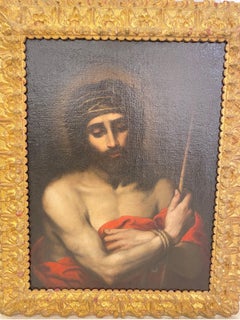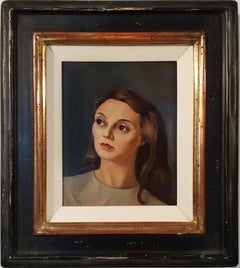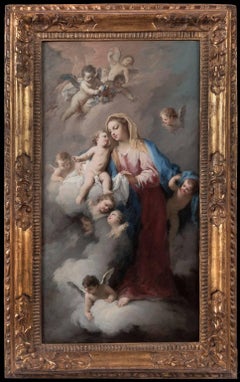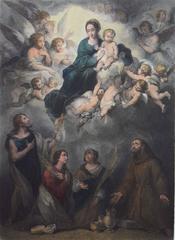Bartolome Esteban Murillo Art
to
1
1
1
1
Overall Height
to
Overall Width
to
1
1
1
1
1
1
6,935
3,285
2,514
1,213
1
1
Artist: Bartolomé Esteban Murillo
Ecce Homo
By Bartolomé Esteban Murillo
Located in MADRID, ES
Oil on canvas.
Bartolomé Esteban Murillo and workshop.
Certificated by Enrique Valdivieso who is the most inportant expert in this artist.
Category
17th Century Bartolome Esteban Murillo Art
Materials
Canvas
Related Items
Portrait de Femme ( Self Portrait ? )
By Leonor Fini
Located in Miami, FL
This is a possible self portrait by the famed female surrealist artist. It is also strikingly similar in style with it's exaggerated eyes to her portrait of Jean Genet, ( Leonor F...
Category
1940s Surrealist Bartolome Esteban Murillo Art
Materials
Canvas, Oil
Madonna and Child with Angels in the Clouds
Located in New York, NY
Provenance: Charles H. and Virginia Baldwin, Claremont, Colorado Springs, Colorado ca. 1907-1934; thence by descent until sold in 1949 to:
Charles Blevins Davis, Claremont (renamed Trianon), Colorado Springs 1949 -until gifted in 1952 to:
The Poor Sisters of Saint Francis, Trianon, Colorado Springs, 1952 until acquired, 1960, by:
John W. Metzger, Trianon, renamed as the Trianon School of Fine Arts, Colorado Springs, 1960-1967; when transferred to:
The Metzger Family Foundation, Trianon Art Museum, Denver, 1967 - 2004; thence by descent in the Metzger Family until 2015
Exhibited: Trianon Art Museum, Denver (until 2004)
The present work is a spectacular jewel-like canvas by Amigoni, rich in delicate pastel colors, most likely a modello for an altarpiece either lost or never painted. In it the Madonna stands firmly upon a cloud in the heavens, her Child resting on a delicate veil further supported by a cloud, as he gently wraps his arm around his mother’s neck. From above angels prepare to lower flowers and a wreath, while other angels and seraphim surrounding the two joyfully cavort.
Dr. Annalisa Scarpa, author of the forthcoming monograph on Jacopo Amigoni...
Category
18th Century and Earlier Bartolome Esteban Murillo Art
Materials
Canvas, Oil
Portrait of a Lady with a Chiqueador
Located in New York, NY
Provenance: Torres Family Collection, Asunción, Paraguay, ca. 1967-2017
While the genre of portraiture flourished in the New World, very few examples of early Spanish colonial portraits have survived to the present day. This remarkable painting is a rare example of female portraiture, depicting a member of the highest echelons of society in Cuzco during the last quarter of the 17th century. Its most distinctive feature is the false beauty mark (called a chiqueador) that the sitter wears on her left temple. Chiqueadores served both a cosmetic and medicinal function. In addition to beautifying their wearers, these silk or velvet pouches often contained medicinal herbs thought to cure headaches.
This painting depicts an unidentified lady from the Creole elite in Cuzco. Her formal posture and black costume are both typical of the established conventions of period portraiture and in line with the severe fashion of the Spanish court under the reign of Charles II, which remained current until the 18th century. She is shown in three-quarter profile, her long braids tied with soft pink bows and decorated with quatrefoil flowers, likely made of silver. Her facial features are idealized and rendered with great subtly, particularly in the rosy cheeks.
While this portrait lacks the conventional coat of arms or cartouche that identifies the sitter, her high status is made clear by the wealth of jewels and luxury materials present in the painting. She is placed in an interior, set off against the red velvet curtain tied in the middle with a knot on her right, and the table covered with gold-trimmed red velvet cloth at the left. The sitter wears a four-tier pearl necklace with a knot in the center with matching three-tiered pearl bracelets and a cross-shaped earing with three increasingly large pearls. She also has several gold and silver rings on both hands—one holds a pair of silver gloves with red lining and the other is posed on a golden metal box, possibly a jewelry box. The materials of her costume are also of the highest quality, particularly the white lace trim of her wide neckline and circular cuffs.
The historical moment in which this painting was produced was particularly rich in commissions of this kind. Following his arrival in Cuzco from Spain in the early 1670’s, bishop Manuel de Mollinedo y Angulo actively promoted the emergence of a distinctive regional school of painting in the city. Additionally, with the increase of wealth and economic prosperity in the New World, portraits quickly became a way for the growing elite class to celebrate their place in society and to preserve their memory. Portraits like this one would have been prominently displayed in a family’s home, perhaps in a dynastic portrait gallery.
We are grateful to Professor Luis Eduardo Wuffarden for his assistance cataloguing this painting on the basis of high-resolution images. He has written that “the sober palette of the canvas, the quality of the pigments, the degree of aging, and the craquelure pattern on the painting layer confirm it to be an authentic and representative work of the Cuzco school of painting...
Category
17th Century Old Masters Bartolome Esteban Murillo Art
Materials
Canvas, Oil
H 66.25 in W 43.75 in
Oil Painting / Photorealism / Figurative Art / Human Figure /Museum
By Bruce Adams
Located in Buffalo, NY
Bruce Adams was a painter, art educator, and writer. Born in Buffalo, N.Y., in 1952, he received a B.S. in 1976 and an M.A. in 1983 from Buffalo State College. Adams’s work is includ...
Category
1980s Contemporary Bartolome Esteban Murillo Art
Materials
Canvas, Oil
Minimalist black and white painting of a Greyhound dog by British Ian Mason
By Ian Mason
Located in Charleston, US
Greyhound, This stunning large minimalist black and white painting of a Greyhound dog, is a contemporary portrait in acrylic on canvas. Ian Mason's portrai...
Category
21st Century and Contemporary Minimalist Bartolome Esteban Murillo Art
Materials
Acrylic, Canvas
Portrait of Laura Keppel, later Lady Southampton
By Sir John Hoppner
Located in New York, NY
Inscribed, upper left: “Miss Laura Keppel”
Provenance: Commissioned from the artist and by descent in the Keppel family estate, Lexham Hall, Norfolk, to:
Major Bertram William Arnol...
Category
18th Century Bartolome Esteban Murillo Art
Materials
Canvas, Oil
Model undressing
Located in BELEYMAS, FR
Julius EXNER
(Copenhagen, 1825 - Copenhagen, 1910)
Model stripping
Oil on canvas
H. 122 cm; L. 74 cm
Signed and dated 1842 lower right
Exhibition: most likely Charlottenborg Salon of 1845, under number 110, titled Modelfigur, awarded with a silver medal
Provenance: Emilio Fernando Bolt (c.1860 - 1944), acquired from the artist around 1900, then by descent
Our painting was produced as part of the summer sessions organized between 1839 and 1850 by Christoffer Wilhelm Eckersberg (1783-1853), the master of Danish painting of the first half of the 19th century, in his private studio-apartment on the ground floor. floor at the Royal Academy of Fine Arts in Copenhagen. The master brought together a few students there between June and September, rented one or two models for the season, which were painted from different angles, the artists (including Eckersberg himself) sitting side by side. Eckersberg used to paint a fairly small version, the pupils of the larger formats.
The work fits more generally into the legendary context of the research and reforms carried out by Eckersberg concerning the studies of nudes and in particular of female nudes, to make this exercise a genre of painting in its own right.
Following his two-year stint in Jacques-Louis David's studio in Paris in 1811, Eckersberg had been made aware of work on the nude and in particular on live models, in natural light, while in Denmark the drawings were then only made from casts of antique models or other mannequins. In 1822, when he had been a professor there since 1818, it was he who had the Royal Academy of Copenhagen authorize the study of nudes, no longer in the evening by candlelight, but in natural light; from 1833, it was still he who allowed students to work on nude female models, even if the official authorization of the Academy did not take place until 1839.
It was this same year that he instituted his summer sessions, on a private basis, to orient his painting and that of his students towards a new conception of the representation of models: even if the nude remains the real theme, it does not however, this is more than just an academic exercise. The subject is placed in a contemporary interior, with a rather sophisticated decor, and occupied with an intimate activity (it is this type of intimate vein that we will find later in Degas or Cassatt for example); thus in our painting, the young woman is supposed to take off her clothes to wash. The objective is that the viewer forgets that the master and his students are painting a model during a posing session, and that he instead has the impression of being alone with the model, but invisible, almost like a voyeur in spite of himself. Moreover, in these paintings, the model never looks towards the spectator, inducing a psychological distance with him, whereas model and artist are actually physically very close. On the other hand, it is not a question of idealized nudes either, even if Eckersberg, proof of his debt to the antique, chooses fairly classic models and poses. The sensuality is real and very present, with dreamy, even innocent, and timeless expressions (the models do not seem to have a defined age), suave and slow attitudes and movements, and especially with clothes that hide or reveal skillfully parts of the female body: upper buttocks, pronounced hips...
Made by an artist under 20, our sensual painting is probably one of the most beautiful and spectacular produced by the students of Eckersberg during these summer sessions. With a perfect balance between the firmness of an ancient statue (it recalls the Venus de Milo) and the softness of the feminine forms, highlighted by a harmonious palette, it captures the attention with many details: the almost photographic folds white clothing...
Category
1840s French School Bartolome Esteban Murillo Art
Materials
Canvas, Oil
Superman - Last Son of Krypton - oil on canvas painting by Blend Cota
By Blend Cota
Located in Montreal, Quebec
Artist Notes :
I am enamoured with Superman and everything he stands for. He is the uber-immigrant, something people often forget. He is not human but merely looks human. Kal-El the ...
Category
21st Century and Contemporary Pop Art Bartolome Esteban Murillo Art
Materials
Canvas, Mixed Media, Oil
Men portrait
By Giovanni Maria delle Piane dit Mulinaretto (Genoa 1670 - Monticelli d´Ongina 1745)
Located in BELEYMAS, FR
Giovanni Maria DELLE PIANE, known as IL MULINARETTO
(Genoa, 1660 – Monticelli d'Ongina, 1745)
Portrait of a man
Oil on oval canvas
H. 108 cm; L. 83 cm
Provenance: Nino Ferrari Colle...
Category
1730s Italian School Bartolome Esteban Murillo Art
Materials
Canvas, Oil
Free Shipping
H 42.52 in W 32.68 in
Presumed portrait of Princess de Conti, Marie-Anne de Bourbon
By Nicolas de Largillière
Located in BELEYMAS, FR
Nicolas de LARGILLIERRE
(Paris 1656 – 1746)
Portrait of a woman, presumed to be Marie-Anne de Bourbon, Princess of Conti (1666-1739)
Oil on oval canvas
H. 80 cm; L. 61 cm (107 x 91 c...
Category
1730s French School Bartolome Esteban Murillo Art
Materials
Canvas, Oil
Free Shipping
H 31.5 in W 24.02 in
[Bruce Sargeant (1898-1938)] Five Gymnasts in Training
By Mark Beard
Located in New York, NY
Oil on canvas
Signed in red, u.r.
$16,000.00 + framing
This artwork is offered by ClampArt, located in New York City.
“Bruce Sargeant is a mythic figure in the modern art movement...
Category
21st Century and Contemporary Realist Bartolome Esteban Murillo Art
Materials
Canvas, Oil
Madonna Addolorata By Sassoferrato
By Giovanni Battista Salvi da Sassoferrato
Located in New Orleans, LA
Sassoferrato (Giovanni Battista Salvi)
1609-1685 Italian
Madonna Addolorata
Oil on canvas
Celebrated Italian artist Sassoferrato and his moving religious imagery are the epitome ...
Category
17th Century Baroque Bartolome Esteban Murillo Art
Materials
Canvas, Oil
H 38.5 in W 32.38 in D 3.63 in
Previously Available Items
Apotheosis of The Virgin
By Bartolomé Esteban Murillo
Located in Saint Augustine, FL
An original hand watercolored steel plate engraving after Spanish artist Bartolomé Esteban Murillo (1617-1682) titled "Apotheosis of The Vir...
Category
Late 19th Century Old Masters Bartolome Esteban Murillo Art
Materials
Steel
Bartolomé Esteban Murillo art for sale on 1stDibs.
Find a wide variety of authentic Bartolomé Esteban Murillo available for sale on 1stDibs. You can also browse by medium to find art by Bartolomé Esteban Murillo in canvas, fabric and more. Not every interior allows for large Bartolomé Esteban Murillo, so small editions measuring 21 inches across are available. Customers who are interested in this artist might also find the work of Montse Valdés, Lino Lago, and Josep Serrasanta. Bartolomé Esteban Murillo prices can differ depending upon medium, time period and other attributes. On 1stDibs, the price for these items starts at $99,859 and tops out at $99,859, while the average work can sell for $99,859.
Artists Similar to Bartolomé Esteban Murillo
Questions About Bartolome Esteban Murillo Art
- 1stDibs ExpertApril 5, 2022Bartolomé Esteban Murillo is famed for his work as a painter in the Baroque style. He was born in 1617 in Seville, Spain, and is renowned for his art, which often featured religious themes. His work was known for its realism style. Browse 1stDibs to find a range of authentic Bartolomé Esteban Murillo pieces from top sellers



